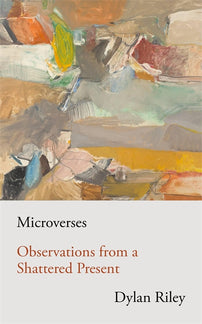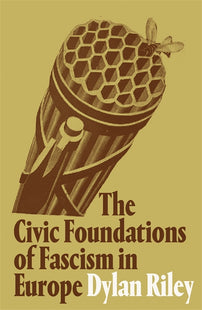History is the medium of human existence
An interview with Dylan Riley on Microverses, viewing the present as history, and what sociology has to offer the left

The subtitle of Microverses speaks of a “shattered present." Could you tell us a little about the circumstances in which it was written?
Two crises, one global epochal the other personal, shattered the present to which the title refers. The first crisis was the outbreak of the global Covid-19 pandemic, which began for me on March 12th 2020, my late wife Emanuela Tallo's fiftieth birthday. The second, personal, crisis was Emanuela's diagnosis of a terminal cancer on August 24th 2020, just a little over five months into the first crisis. These events are connected for me because they mark an irrevocable caesura between the before and the after. The world that opened after March 12th 2020, and particularly after August 24th 2020 is, at a subjective experiential level quite distinctive for me, from what came before.
How do you situate Microverses within your wider work? Have you continued taking notes as you did throughout the writing the book?
Microverses commits to writing thoughts I have had for some time, as well as drawing from "immediate" experience. I think it draws out some broader theoretical issues that were at least implicitly touched on in my earlier work; but it presents the ideas in a different form, which in part changes their content. I hope they appear more compactly, and more generally as well. I have lately been working on a book of vignettes and meditations, which is in part a memoire dedicated to Emanuela. The writing for this project is more personal, rather than social theoretical, and in that way differs from the current book. I'm as yet unsure if it has an audience, but I would like to continue experimenting with new forms of expression. One of the big problems of American social science in particular, is its deadening style, to which its professional practitioners, I very much include myself, must all adhere. Indeed, the ideological function of style in the social sciences is an important topic of cultural analysis. Style in this case operates as membrane to seal off and neutralize forms of social self-reflection that are the precondition for an effective Left politics in particular. This is a huge problem.
A recent piece in the New Statesman emphasised the parallels, and contrasts, between Microverses and Adorno’s Minima Moralia. How big of an influence was Minima Moralia, in fact?
Stylistically there are obvious similarities. But, although I read Minima Moralia some decades before, I began these notes without any conscious model. It was only afterwards that I was prompted to think about Adorno's text as a model. So in general I would say that intellectually Minima Moralia was not really a big influence.
Many of your notes from the early pandemic read as a grappling with a very recent past - it feels like it hasn’t quite reached the expiration date where seems appropriate to look back and “study.” Can you elaborate on your approach of recording history as it happens, viewing the “present as history,” and looking at the recent past? What did you find on taking this approach?
This question raises a rather deep issue, namely whether it is possible to think the present historically, or whether the past is accessible only in retrospect. I guess I strongly think it is possible to think about the present historically, and that is because history is not a chronicle of past events, but is rather the medium of human existence as it is lived. To "think historically" then is an act of self-consciousness, not the identification of a topic of study.
In Microverses, you write that “Marxism’s two main twentieth-century revivals, in the twenties and sixties, were both marked by a productive cross-fertilization with sociology,” and that the current left’s lack of engagement with sociology means “new socialist and progressive literature relies heavily on essentially legalistic concepts in its mode of social analysis.” Can you elaborate on what you mean by legalistic concepts? What does sociology have to offer to enrich the left’s analysis?
The Anglo-American Left, in particular, is suffused with legalism not so much in strategic or tactical terms, but in terms of its basic intellectual approach. I remember being struck by this fact when I first read Erik Olin Wright's Envisioning Real Utopias. The critique of capitalism offered there was based on a series of eleven "harms" and tried to develop a politics aimed at redressing them. I found and find this approach to be antithetical to the most powerful intellectual legacy of Marxism which was its identification of the existing social order as a contradictory unity of realized and suppressed historical possibilities. In my view, the observation that capitalism is unfair or unjust is utterly trivial; for exactly the same thing could be said about every class society in history. Such a claim of unfairness certainly would not in the least disturb a thinker of Hayek's stature who treated the notion that market outcomes were just with the contempt that it so richly deserves. "Justice" and "fairness" are in short weak and moralistic ideas; they cannot form the basis of a serious politics, and the sooner that the Left learns, or rather re-learns, this fact, the better. Sociology has only this to offer: the promise of the scientific study of the social world as the precondition for effectively acting upon it rather than impotently condemning it.
"Democracy’s reactionary critics are as a rule far more perceptive about representative regimes than liberal apologists.” Can you explain what liberals miss in their defense of representative regimes? Does this critique of liberals hold up through your studies of historical fascism?
Liberals, and perhaps many misguided leftists as well, never clearly distinguish between democracy as a principle of legitimacy, and the institutional mechanisms that claim to institute or realize that principle. What the conservative tradition understood (Mosca, Weber, Schmitt, and in a peculiar way Schumpeter also) is that democracy, at least in capitalist society, is best approached as an ideology or a myth. The "people rule" in the contemporary world in exactly the same sense that "God's representative on Earth" ruled in the Absolutist monarchies of the early modern period. This is directly applicable to my studies of fascism, which I treated as "authoritarian democracies" because they claimed to institute the democratic idea through authoritarian means. Only from the liberal perspective does this appear as a contradictory idea, that is to say only from a perspective that dogmatically equates democracy with a representative regime.
You correctly anticipated that inflation would be the big worry for the incoming Biden administration, even though at the time you are writing, the warnings coming from the likes of Larry Summers are being ignored. How do you think the inflation crisis has since panned out politically?
I think I was basically correct in the note "No social democrats here". Of course Covid-19 and the Russian invasion of Ukraine are adding to inflationary pressures, but massive deficit spending is part of the picture as well. What exactly Bidenism or Bidenomics is, is not entirely clear to me. But it is not, because it cannot be, a social democratic class compromise based on growth.
Your work overall points towards a skepticism of organization in itself being of much value to the left without proper ideological development. What do you make of the US left’s current ideological standing along with its current dominant organizational form of “big tent” organizations?
Lenin was one of the greatest students of organizations that the world has ever known. He understood exactly what the problem of left politics was: to link together particular sectoral demands in a broader project. The type of unity he posited was the opposite of "compromise" or "bargaining" among pre-constituted groups. But Lenin's notion could only work because his politics was resolutely aimed at the establishment of a new social order. It is in the making of history that "group demands" are fused in novel forms of social subjectivity. But to make history one needs a destination, and that's what's missing. This is not a problem that can be solved through organizing techniques. It requires a combination of inspired imagination and clear-analytics of the contradictory nature of the contemporary social world. But it also requires that history itself provide the answer. Unfortunately we still live in the age of Fukuyama.
In The Civic Foundations of Fascism in Europe, when analyzing the Italian situation you mention that cooperative movements were encouraged by elites in order to have them take care of their own. In your overview of Germany you write that “as the trade unions expanded rapidly in the period prior to World War I, political militancy declined.” We’re currently witnessing the growth of unions in the US, an expanding interest in cooperatives, and a rising DSA movement. Do you see a similar danger in these organizations acting as potential “buffers” to political militancy? How does the left build working class organizations that maintain a revolutionary view?
The re-emergence of DSA, renewed working class militancy, and interest in socialism are very positive developments. But the problem you are referring to really is one of the major challenges that capitalist democracy poses to the left. We could put it this way. By according political rights to workers, who still however must work most of the day and therefore have little time to devote to politics, extensive suffrage almost automatically encourages the development of a professional stratum (union representatives and left-social democratic politicos) whose immediate material interests become bound up with the bourgeois state itself. "Reformism" in this sense is a structural feature of capitalist democracy. Conversely, this is why the most militant and class conscious socialist parties have always developed in contexts of partial parliamentarization, such as Wilhelmine Germany or Liberal Italy. This point has been made repeatedly in the history of the Left. Think of Lenin, Luxemburg, Michels, Sorel, and more recently Brenner and Przeworski. The point to always keep in mind is that representative "democracy" is one of the main mechanisms that insulates capitalism from the class struggle.
[book-strip index="1" style="display"]

